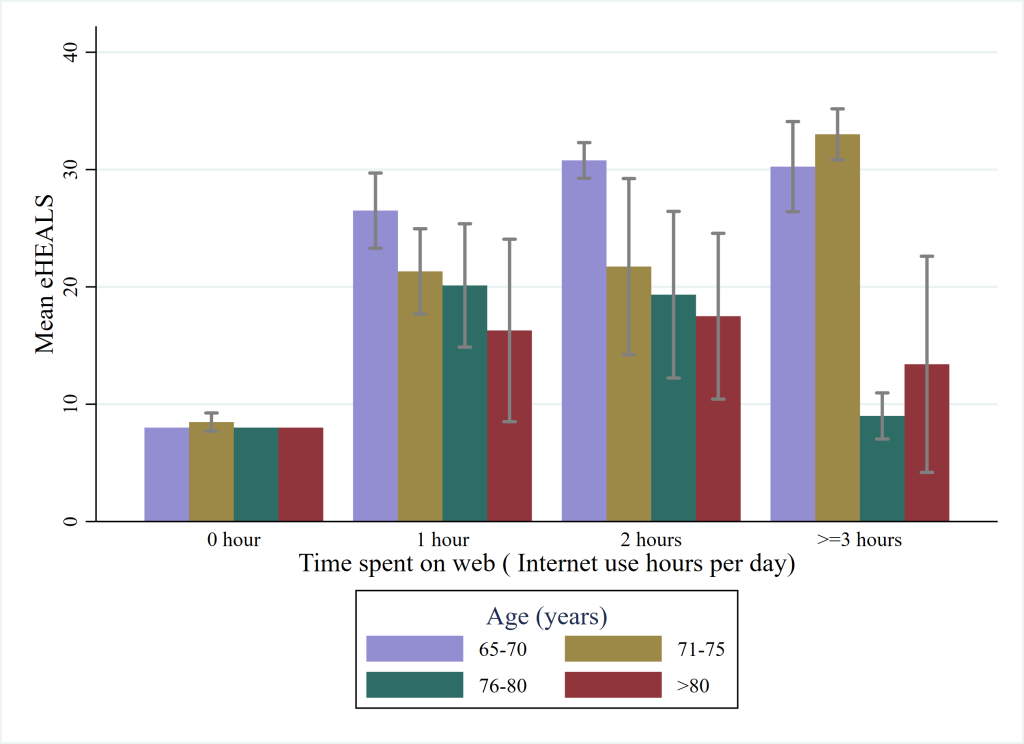Press Release: DIHAC study publication about eHealth Literacy among community older adults in the Republic of Korea
New Research Article from DIHAC study
Bridging Grey Digital Divide: Research Highlights the need of Enhanced eHealth Literacy Among Silver Population
Digitally Inclusive Healthy Ageing Communities (DIHAC) team recently published an article named “Socio-digital determinants of eHealth Literacy and Related Impact on Health Outcomes and eHealth Use in Korea Older Adults: Community-Based Cross-sectional Survey” in JMIR Aging (Impact Factor 5.0). The article timely explored eHealth literacy, a demanding skill to steer through digital health resources, among older adults in Republic of Korea. The author quoted that “An insight into eHealth literacy in older adults is a crucial step in closing digital health information access gap, especially at the intersection of population ageing and digital transformation”. The research aimed for deeper understanding of social and digital determinants of eHealth literacy and its impact on health outcomes and eHealth use in older population of Korea.
This study is a part of the ongoing research project “Digitally Inclusive Healthy Ageing Communities: A cross-cultural study in Japan, Republic of Korea, Singapore and Thailand” lead by Primary Investigator Associate Professor Myo Nyein Aung. DIHAC team is a collaboration of Yonsei University, ROK, Singapore University of Social Sciences, Singapore, Chiang Mai Rajabhat University, Thailand and Juntendo University, Japan. The first author Myat Yadana Kyaw is affiliated to the Department of Global Health Research, Juntendo University, Tokyo Japan as PhD candidate.
With 434 participants involved, this observational cross-sectional study took place in two semi-urban cities in the Republic of Korea in 2022. Ethical Approval was obtained from Juntendo University ethical committee and Yonsei University Institutional Review Board. Ordinal logistic regressions were used to find out the factors relating to eHealth literacy of older adults and multivariate analysis of variance assessed the impact of eHealth literacy on self-perceived health, internet and digital technology utilisation to improve dietary habits, access health services and long-term care services.
The result found that increasing age was a predictor of relative lower level of eHealth literacy, but a higher income and digital technology usage were identified to enhance it. Interestingly, daily time spent on the internet increased the eHealth literacy from 19 to 35 times than non-users depending on the time spent. In addition, social media users were 3.9 times more likely to have higher eHealth literacy than non-users. Furthermore, higher eHealth literacy among older Koreans had a significant impact on their health outcomes and digital health technology utilization.

Figure: Level of eHealth literacy of different age groups by different categories of daily time spent on the web among older Korean adults. eHEALS: eHealth Literacy Scale. Kyaw et al. (2024)/ JMIR Aging /https://doi.org/10.2196/56061
The study also highlighted the need for promotion of eHealth literacy among Korean older adults and the hints that social media and internet use as the way to improve eHealth literacy. The evidence provided by the study acts as a starting point for eHealth literacy interventions and informs stakeholders on inclusion of older adults in curating digital health policies.
For more information, please read the full article here.
The authors extend their sincere gratitude to everyone who contributed to the collaborative effort thanks to Yonsei University, Centre for Global Health.
Reference
| Authors | Myat Yadana Kyaw 1, Myo Nyein Aung 1,2,3,*, Yuka Koyanagi 4, Saiyud Moolphate5, Thin Nyein Nyein Aung6, Carol Ma Hok Ka 7, Hocheol Lee 8, Haekweun Nam9, Eun Woo Nam 10and Motoyuki Yuasa 1,2 |
| Title of original research article | Sociodigital Determinants of eHealth Literacy and Related Impact on Health Outcomes and eHealth Use in Korean Older Adults: Community-Based Cross-Sectional Survey |
| Journal | JMIR Aging |
| DOI | doi: 10.2196/56061 |
| Affiliations | 1Department of Global Health Research, Graduate School of Medicine, Juntendo University, Tokyo 113-8421, Japan 2Faculty of International Liberal Arts, Juntendo University, Tokyo 113-8421, Japan 3Advanced Research Institute for Health Sciences, Juntendo University, Tokyo 113-8421, Japan 4Department of Judo Therapy, Faculty of Health Sciences, Tokyo Ariake University of Medical and Health Sciences, Tokyo 135-0063, Japan 5Department of Public Health, Faculty of Science and Technology, Chiang Mai Rajabhat University, Chiang Mai 50300, Thailand 6Department of Family Medicine, Faculty of Medicine, Chiang Mai University, Chiang Mai 50200, Thailand 7S R Nathan School of Human Development, Singapore University of Social Sciences, Singapore 599494, Singapore 8Department of Health Administration, Yonsei University Graduate School, Wonju City, 26493, Republic of Korea; 9Department of Preventive Medicine, Wonju Medical College, Republic of Korea 10Department of Health Administration, Software Digital Healthcare Convergence College, Yonsei University, Wonju City, 26493, Republic of Korea *Correspondence: Myo Nyein Aung, Principal Investigator, DIHAC study |
About DIHAC study
Digitally Inclusive, Healthy Ageing Communities (DIHAC) is a cross-cultural study primarily based on Japan, the Republic of Korea, Singapore, and Thailand, further expanding to India and China. The study aims to explain contextual influences of digital inclusion and its consequences on healthy ageing in Japan, Republic of Korea, Singapore and Thailand.
This research was funded by the Japanese Ministry of Education, Culture, Sports, Science and Technology, Grant-in-Aid for Scientific Research 21H00795 and 23K20657. The authors declare no COI.
